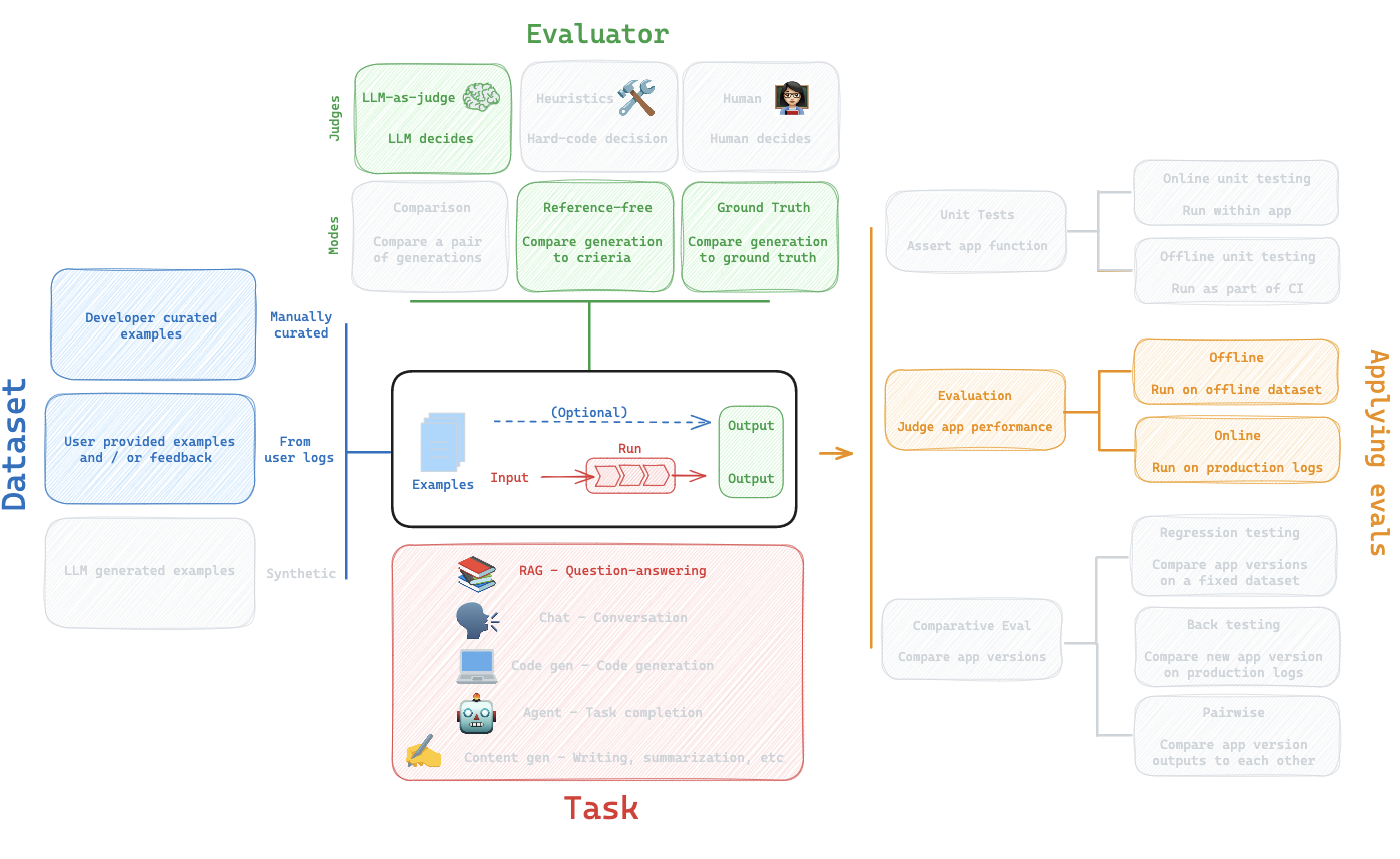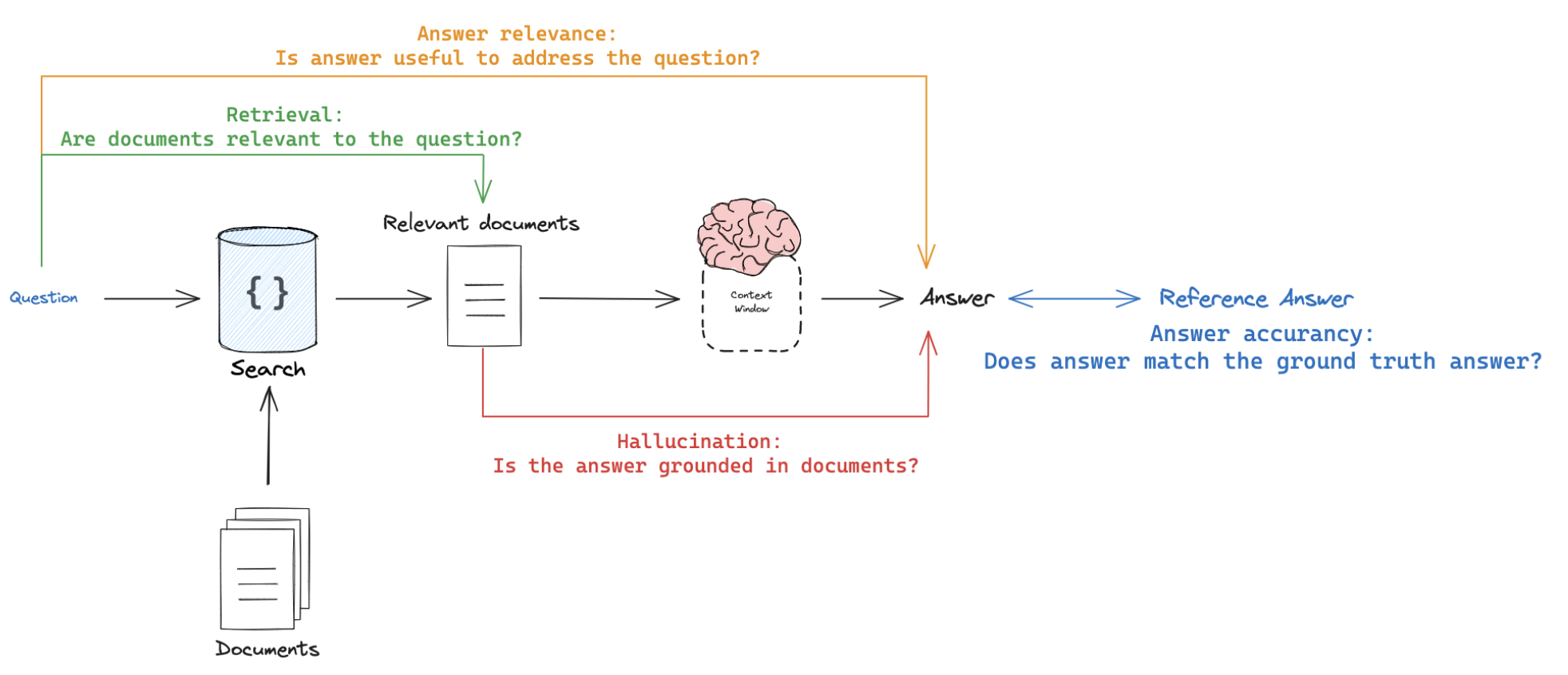RAG Evaluations
We will walk through the evaluation workflow for RAG (retrieval augmented generation).
Overview
We will discuss each piece of the workflow below.

Dataset
Here is a dataset of LCEL (LangChain Expression Language) related questions that we will use.
This dataset was created using csv upload in the LangSmith UI:
https://smith.langchain.com/public/730d833b-74da-43e2-a614-4e2ca2502606/d
Here, we ensure that API keys for OpenAI as well as LangSmith are set.
import getpass
import os
def _set_env(var: str):
if not os.environ.get(var):
os.environ[var] = getpass.getpass(f"{var}: ")
_set_env("OPENAI_API_KEY")
os.environ["LANGCHAIN_TRACING_V2"] = "true"
os.environ["LANGCHAIN_ENDPOINT"] = "https://api.smith.langchain.com"
_set_env("LANGCHAIN_API_KEY")
### Dataset name
dataset_name = "LCEL-QA"
Task
Here is a chain that will perform RAG on LCEL (LangChain Expression Language) docs.
We will be using LangChain strictly for creating the retriever and retrieving the relevant documents.
The overall pipeline does not use LangChain; LangSmith works regardless of whether or not your pipeline is built with LangChain.
Here, we return the retrieved documents as part of the final answer.
However, below we will show that this is not required (using evaluation of intermediate steps).
See our RAG-From-Scratch repo and tutorial video series for more on this.
### INDEX
from bs4 import BeautifulSoup as Soup
from langchain_community.vectorstores import Chroma
from langchain_openai import OpenAIEmbeddings
from langchain_community.document_loaders.recursive_url_loader import RecursiveUrlLoader
from langchain_text_splitters import RecursiveCharacterTextSplitter
# Load docs
url = "https://python.langchain.com/v0.1/docs/expression_language/"
loader = RecursiveUrlLoader(
url=url, max_depth=20, extractor=lambda x: Soup(x, "html.parser").text
)
docs = loader.load()
# Split into chunks
text_splitter = RecursiveCharacterTextSplitter(chunk_size=4500, chunk_overlap=200)
splits = text_splitter.split_documents(docs)
# Embed and store in Chroma
vectorstore = Chroma.from_documents(documents=splits, embedding=OpenAIEmbeddings())
# Index
retriever = vectorstore.as_retriever()
### RAG bot
import openai
from langsmith import traceable
from langsmith.wrappers import wrap_openai
class RagBot:
def __init__(self, retriever, model: str = "gpt-4-0125-preview"):
self._retriever = retriever
# Wrapping the client instruments the LLM
self._client = wrap_openai(openai.Client())
self._model = model
@traceable()
def retrieve_docs(self, question):
return self._retriever.invoke(question)
@traceable()
def invoke_llm(self, question, docs):
response = self._client.chat.completions.create(
model=self._model,
messages=[
{
"role": "system",
"content": "You are a helpful AI code assistant with expertise in LCEL."
" Use the following docs to produce a concise code solution to the user question.\n\n"
f"## Docs\n\n{docs}",
},
{"role": "user", "content": question},
],
)
# Evaluators will expect "answer" and "contexts"
return {
"answer": response.choices[0].message.content,
"contexts": [str(doc) for doc in docs],
}
@traceable()
def get_answer(self, question: str):
docs = self.retrieve_docs(question)
return self.invoke_llm(question, docs)
rag_bot = RagBot(retriever)
response = rag_bot.get_answer("How to build a RAG chain in LCEL?")
response["answer"][:150]
Define a function that will:
- Take a dataset
example - Extract the relevant key (e.g.,
question) from theexample - Pass it to the RAG chain
- Return the relevant output values from the RAG chain
def predict_rag_answer(example: dict):
"""Use this for answer evaluation"""
response = rag_bot.get_answer(example["input_question"])
return {"answer": response["answer"]}
def predict_rag_answer_with_context(example: dict):
"""Use this for evaluation of retrieved documents and hallucinations"""
response = rag_bot.get_answer(example["input_question"])
return {"answer": response["answer"], "contexts": response["contexts"]}
Evaluator
There are at least 4 types of RAG eval that users are typically interested in.
- Response vs reference answer
Goal: Measure "how similar/correct is the RAG chain answer, relative to a ground-truth answer"Mode: Uses ground truth (reference) answer supplied through a datasetJudge: Use LLM-as-judge to assess answer correctness.
- Response vs input
Goal: Measure "how well does the generated response address the initial user input"Mode: Reference-free, because it will compare the answer to the input questionJudge: Use LLM-as-judge to assess answer relevance, helpfulness, etc.
- Response vs retrieved docs
Goal: Measure "to what extent does the generated response agree with the retrieved context"Mode: Reference-free, because it will compare the answer to the retrieved contextJudge: Use LLM-as-judge to assess faithfulness, hallucinations, etc.
- Retrieved docs vs input
Goal: Measure "how good are my retrieved results for this query"Mode: Reference-free, because it will compare the question to the retrieved contextJudge: Use LLM-as-judge to assess relevance

Response vs reference answer
Here is an example prompt that we can use:
https://smith.langchain.com/hub/langchain-ai/rag-answer-vs-reference
Here is the a video from our LangSmith evaluation series for reference:
https://youtu.be/lTfhw_9cJqc?feature=shared
Here is our evaluator function:
runis the invocation ofpredict_rag_answer, which has keyanswerexampleis from our eval set, which has keysinput_questionandoutput_answer- We extract these values and pass them into our grader
from langchain import hub
from langchain_openai import ChatOpenAI
# Grade prompt
grade_prompt_answer_accuracy = prompt = hub.pull("langchain-ai/rag-answer-vs-reference")
def answer_evaluator(run, example) -> dict:
"""
A simple evaluator for RAG answer accuracy
"""
# Get question, ground truth answer, RAG chain answer
input_question = example.inputs["input_question"]
reference = example.outputs["output_answer"]
prediction = run.outputs["answer"]
# LLM grader
llm = ChatOpenAI(model="gpt-4-turbo", temperature=0)
# Structured prompt
answer_grader = grade_prompt_answer_accuracy | llm
# Run evaluator
score = answer_grader.invoke({"question": input_question,
"correct_answer": reference,
"student_answer": prediction})
score = score["Score"]
return {"key": "answer_v_reference_score", "score": score}
Now, we kick off evaluation:
predict_rag_answer: Takes anexamplefrom our eval set, extracts the question, passes to our RAG chainanswer_evaluator: Passes RAG chain answer, question, and ground truth answer to an evaluator
from langsmith.evaluation import evaluate
experiment_results = evaluate(
predict_rag_answer,
data=dataset_name,
evaluators=[answer_evaluator],
experiment_prefix="rag-answer-v-reference",
metadata={"version": "LCEL context, gpt-4-0125-preview"},
)
Response vs input
Here is an example prompt that we can use:
https://smith.langchain.com/hub/langchain-ai/rag-answer-helpfulness
The information flow is similar to above, but we simply look at the run answer versus the example question.
# Grade prompt
grade_prompt_answer_helpfulness = prompt = hub.pull("langchain-ai/rag-answer-helpfulness")
def answer_helpfulness_evaluator(run, example) -> dict:
"""
A simple evaluator for RAG answer helpfulness
"""
# Get question, ground truth answer, RAG chain answer
input_question = example.inputs["input_question"]
prediction = run.outputs["answer"]
# LLM grader
llm = ChatOpenAI(model="gpt-4-turbo", temperature=0)
# Structured prompt
answer_grader = grade_prompt_answer_helpfulness | llm
# Run evaluator
score = answer_grader.invoke({"question": input_question,
"student_answer": prediction})
score = score["Score"]
return {"key": "answer_helpfulness_score", "score": score}
experiment_results = evaluate(
predict_rag_answer,
data=dataset_name,
evaluators=[answer_helpfulness_evaluator],
experiment_prefix="rag-answer-helpfulness",
metadata={"version": "LCEL context, gpt-4-0125-preview"},
)
Response vs retrieved docs
Here is an example prompt that we can use:
https://smith.langchain.com/hub/langchain-ai/rag-answer-hallucination
Here is the a video from our LangSmith evaluation series for reference:
https://youtu.be/IlNglM9bKLw?feature=shared
# Prompt
grade_prompt_hallucinations = prompt = hub.pull("langchain-ai/rag-answer-hallucination")
def answer_hallucination_evaluator(run, example) -> dict:
"""
A simple evaluator for generation hallucination
"""
# RAG inputs
input_question = example.inputs["input_question"]
contexts = run.outputs["contexts"]
# RAG answer
prediction = run.outputs["answer"]
# LLM grader
llm = ChatOpenAI(model="gpt-4-turbo", temperature=0)
# Structured prompt
answer_grader = grade_prompt_hallucinations | llm
# Get score
score = answer_grader.invoke({"documents": contexts,
"student_answer": prediction})
score = score["Score"]
return {"key": "answer_hallucination", "score": score}
experiment_results = evaluate(
predict_rag_answer_with_context,
data=dataset_name,
evaluators=[answer_hallucination_evaluator],
experiment_prefix="rag-answer-hallucination",
metadata={"version": "LCEL context, gpt-4-0125-preview"},
)
Retrieved docs vs input
Here is an example prompt that we can use:
https://smith.langchain.com/hub/langchain-ai/rag-document-relevance
Here is the a video from our LangSmith evaluation series for reference:
https://youtu.be/Fr_7HtHjcf0?feature=shared
# Grade prompt
grade_prompt_doc_relevance = hub.pull("langchain-ai/rag-document-relevance")
def docs_relevance_evaluator(run, example) -> dict:
"""
A simple evaluator for document relevance
"""
# RAG inputs
input_question = example.inputs["input_question"]
contexts = run.outputs["contexts"]
# LLM grader
llm = ChatOpenAI(model="gpt-4-turbo", temperature=0)
# Structured prompt
answer_grader = grade_prompt_doc_relevance | llm
# Get score
score = answer_grader.invoke({"question":input_question,
"documents":contexts})
score = score["Score"]
return {"key": "document_relevance", "score": score}
experiment_results = evaluate(
predict_rag_answer_with_context,
data=dataset_name,
evaluators=[docs_relevance_evaluator],
experiment_prefix="rag-doc-relevance",
metadata={"version": "LCEL context, gpt-4-0125-preview"},
)
Evaluating intermediate steps
Above, we returned the retrieved documents as part of the final answer.
However, we will show that this is not required.
We can isolate them as intermediate chain steps.
See detail on isolating intermediate chain steps here.
Here is the a video from our LangSmith evaluation series for reference:
https://youtu.be/yx3JMAaNggQ?feature=shared
from langsmith.schemas import Example, Run
from langsmith.evaluation import evaluate
def document_relevance_grader(root_run: Run, example: Example) -> dict:
"""
A simple evaluator that checks to see if retrieved documents are relevant to the question
"""
# Get specific steps in our RAG pipeline, which are noted with @traceable decorator
rag_pipeline_run = next(
run for run in root_run.child_runs if run.name == "get_answer"
)
retrieve_run = next(
run for run in rag_pipeline_run.child_runs if run.name == "retrieve_docs"
)
contexts = "\n\n".join(doc.page_content for doc in retrieve_run.outputs["output"])
input_question = example.inputs["input_question"]
# LLM grader
llm = ChatOpenAI(model="gpt-4-turbo", temperature=0)
# Structured prompt
answer_grader = grade_prompt_doc_relevance | llm
# Get score
score = answer_grader.invoke({"question":input_question,
"documents":contexts})
score = score["Score"]
return {"key": "document_relevance", "score": score}
def answer_hallucination_grader(root_run: Run, example: Example) -> dict:
"""
A simple evaluator that checks to see the answer is grounded in the documents
"""
# RAG input
rag_pipeline_run = next(
run for run in root_run.child_runs if run.name == "get_answer"
)
retrieve_run = next(
run for run in rag_pipeline_run.child_runs if run.name == "retrieve_docs"
)
contexts = "\n\n".join(doc.page_content for doc in retrieve_run.outputs["output"])
# RAG output
prediction = rag_pipeline_run.outputs["answer"]
# LLM grader
llm = ChatOpenAI(model="gpt-4-turbo", temperature=0)
# Structured prompt
answer_grader = grade_prompt_hallucinations | llm
# Get score
score = answer_grader.invoke({"documents": contexts,
"student_answer": prediction})
score = score["Score"]
return {"key": "answer_hallucination", "score": score}
experiment_results = evaluate(
predict_rag_answer,
data=dataset_name,
evaluators=[document_relevance_grader, answer_hallucination_grader],
metadata={"version": "LCEL context, gpt-4-0125-preview"},
)